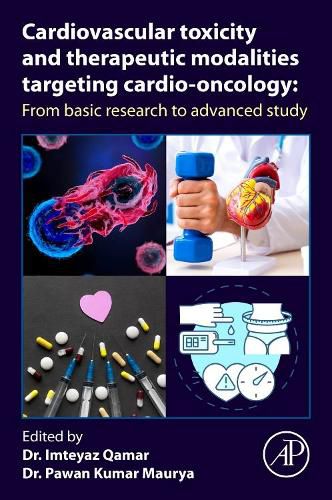Readings Newsletter
Become a Readings Member to make your shopping experience even easier.
Sign in or sign up for free!
You’re not far away from qualifying for FREE standard shipping within Australia
You’ve qualified for FREE standard shipping within Australia
The cart is loading…






Cardiovascular Toxicity and Therapeutic Modalities Targeting Cardio-Oncology: From Basic Research to Advanced Study analyzes the emerging the field of cardio-oncology, reviewing recent advancements in the field, discussing how to monitor and treat cancer survivors for cardiotoxicity, and identifying potential cardiac side effects in novel cancer therapies. By adopting a translational approach, the book first comprehensively covers the basic science, mechanisms and concepts, which is followed by advanced state-of-art of cardio-oncology. Other sections cover tyrosine kinase inhibitors, Anthracyclines, and biomarkers in cardiotoxicity induced by chemotherapeutic drugs, noninvasive cardiovascular imaging techniques, radiotherapy induced cardiovascular, and more.
Anti-cancer treatment is associated with serious cardiovascular adverse events, including arterial and pulmonary hypertension, supraventricular and ventricular arrhythmias, systolic and diastolic cardiac dysfunction and coronary artery disease. Progress in cancer therapy over the past decades improved long-term survival but increased cancer therapy-related cardiotoxicity. Both traditional chemotherapeutic agents and newer therapies have demonstrated profound cardiovascular toxicities. It is important to understand the mechanisms of these toxicities to establish strategies for the prevention and management of complications-arrhythmias, heart failure, and even death.
$9.00 standard shipping within Australia
FREE standard shipping within Australia for orders over $100.00
Express & International shipping calculated at checkout
Cardiovascular Toxicity and Therapeutic Modalities Targeting Cardio-Oncology: From Basic Research to Advanced Study analyzes the emerging the field of cardio-oncology, reviewing recent advancements in the field, discussing how to monitor and treat cancer survivors for cardiotoxicity, and identifying potential cardiac side effects in novel cancer therapies. By adopting a translational approach, the book first comprehensively covers the basic science, mechanisms and concepts, which is followed by advanced state-of-art of cardio-oncology. Other sections cover tyrosine kinase inhibitors, Anthracyclines, and biomarkers in cardiotoxicity induced by chemotherapeutic drugs, noninvasive cardiovascular imaging techniques, radiotherapy induced cardiovascular, and more.
Anti-cancer treatment is associated with serious cardiovascular adverse events, including arterial and pulmonary hypertension, supraventricular and ventricular arrhythmias, systolic and diastolic cardiac dysfunction and coronary artery disease. Progress in cancer therapy over the past decades improved long-term survival but increased cancer therapy-related cardiotoxicity. Both traditional chemotherapeutic agents and newer therapies have demonstrated profound cardiovascular toxicities. It is important to understand the mechanisms of these toxicities to establish strategies for the prevention and management of complications-arrhythmias, heart failure, and even death.